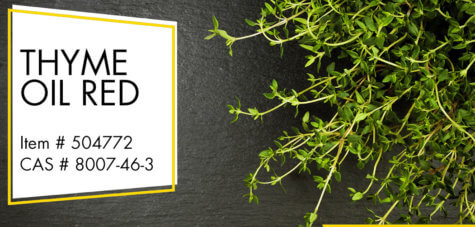Thyme Oil Red
Item#: 504772 CAS: 8007-46-3 FEMA: 3064
Odor Strength: Medium
Odor Description: Herbal, spicy, phenolic, camphoreus, aromatic
Taste Description: Herbal, thyme, spicy, aromatic
Thyme is a culinary herb best known for its strong aromatic flavor. It pairs well with meats, poultry, vegetables, and other herbs such as the delightful “Herbes de Provence” blend. However, its essential oil is often used in perfumery and flavor applications. Its rich, herbaceous scent is often formulated by perfumers in fougere accords and unisex fragrances.
Thyme is native to Europe, specifically around the Mediterranean basin. It is a hearty little botanical, with a genus encompassing nearly 300 species of perennial herbs that vary in flavor, color, and scent. The herb is most fragrant when grown in warm, dry climates, and thus thyme oil is often derived from that grown in Spain and Turkey. When grown commercially for processing into essential oil, thyme is usually harvested once a year in the summer. The harvest is typically by hand, where skilled workers carefully cut the aerial parts of the plant with a sharp sickle. This perennial herb yields abundant harvest between two and six years after initial planting.
Steam distillation produces thyme essential oil. Leaves and twigs are placed into a chamber with pressurized steam. As the steam comes in contact with the plant material, it allows the aroma compounds it contains to evaporate. Then, this vapor is condensed through a cooling chamber. As the steam condenses to water, the oil floats to the top and can easily be skimmed off. The resulting thyme oil is rich in thymol and p-cymene, and other compounds such as carvacrol and linalool. It is important to note that there is actually no difference between red and white thyme oil, it is simply that some containers cause white thyme oil to oxidize, thus turning it “red”. This oxidation does not dramatically alter the quality or potency of the oil. Turkish and Spanish thyme oils have different compositions due to their differing genome.
Thyme smells herbaceous, medicinal, spicy, and aromatic. Perfumers use it in earthy fougere formulations and accords. Thyme oil marries well with citrus like grapefruit, lemon, and bergamot; and other aromatics such as lavender and tea tree.
Thyme oil is also used in a variety of flavor applications. It is used to season poultry and meat marinade flavors, French and Italian herb blends, and seasonings. The oil can be used in any application where the fresh herb would be used, just in much smaller quantities due to its potency.
Thyme oil has a variety of aromatherapy virtues. When applied topically, it can repel insects and outdoor pests. Thyme oil can be ingested to improve immune function and overall health. Its high thymol content makes it a renowned anti-septic.
If you are interested in seeing a sample or placing an order, please email Nicholas Bourne at nbourne@vigon.com or call 570-422-6026.

